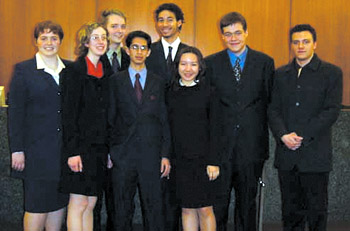 Learning
Legalese
Learning
Legalese
>>While
other students are holed up in the library, Mock Trial competitors
scrimmage their nights away.
There
is no evidence that the undergraduates gathered outside classrooms
at the Law School on February 13 will someday be lawyers. One
student chews his roast-beef sandwich beside other students
in jeans and T-shirts talking about their Soc papers. But as
the clock strikes six, a young woman begins to rub her temples
while glancing over a legal pad littered with notes, and another
woman arrives with a huge briefcase of evidence files and demands
answers: "Are we the defense tonight? Where is Chris? He's
supposed to be the forensic psychologist tonight!"

While
these members of the Chicago Mock Trial team are not all pre-law,
something about mock trial compels them to scrimmage two to
three times a week, each practice trial lasting up to two and
a half hours. "It satisfies my interests in both law and
acting," says Nicky Neulist, '04, a political-science concentrator.
Mock
Trial, a nationwide college competition organized by the American
Mock Trial Association (AMTA), attracts over 300 teams, all
preparing one case issued by AMTA. Since it was founded in 1997,
the Chicago Mock Trial team has competed annually in the Great
Lakes Regional Tournament-going head to head with teams from
Notre Dame, Northwestern, and the University of Illinois-and
has competed at the national level since 1999.
The
Chicago team is divided into four teams, each with six to eight
people and named after one of the Beatle band members. Having
placed first in regional competition February 22-24, team Ringo
goes to the national championship tournament, April 4-7, in
Des Moines, Iowa. Team Paul placed fourth in regionals.
What's
behind the Chicago Mock Trial team's success? According to team
president Ashley Miller, '02, Chicago takes a "less cutesy"
approach than the rest. "Some other schools have witnesses
playing janitors come in wearing a janitor's outfit," Miller
says. "We figure real janitors wouldn't do that for a court
appearance."
There
are no janitors in this year's case, but many witnesses, ranging
from security guards to psychologists, must testify. The case,
The State of the Midlands v. Ashley Thornhill, charges
an ad executive who was passed over for a partnership with the
murder of his boss.
Teams
John, Paul, George, and Ringo also get by with a little help
from their coaches, Greg Weintraub, JD'00, Tracy Katz, JD'00,
and Kevin Kimmerling, AB'01, who competed as an undergraduate.
A litigation associate at a Chicago law firm, Katz, a coach
since 1998, notes that coaches can put in up to three evenings
a week. What sets the Chicago team apart, Katz says, is that
mock trial veterans act as mentors to the team's rookies. "This
core of talented upperclassmen and women will ensure the team's
success," Katz beams, "and is the aspect of the team
I am most proud of."
Team
members share Katz's pride. "My favorite part," Miller
confesses, "is watching students who've never done mock
trial before learn to work as a team. Putting together a case
in mock trial means constantly relying on the skills and insights
of the other members of your team and listening to each other
in every round."
Whether
or not team members go on to law school, mock trial offers more
widely applicable skills, says Katz: "The students learn
teamwork, critical analysis, public speaking, and grace under
the pressure of competition."
- A.W.

![]()
 Learning
Legalese
Learning
Legalese 